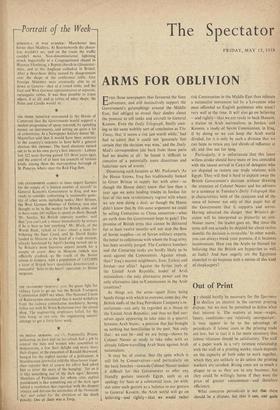ARMS FOR OBLIVION
VEN those newspapers that favoured the Suez Uadventure, and still instinctively support the Government's galumphings around . the Middle East, feel obliged to reveal their doubts about the promise to sell tanks and aircraft to General Kassem. Even the Daily Telegraph, finally com- ing to the same wobbly sort of conclusion as The Times, that 'it seems a risk just worth while,' had had to admit that it could not 'genuinely feel certain that the decision was wise,' and the Daily Mail's correspondent just back from those parts had no doubts at all : he found it 'difficult to conceive of a potentially more disastrous and ludicrous turn of events.'
Dismissing such fatuities as Mr. Profurno's 'As the House knows, Iraq has traditionally looked to Great Britain to supply her with arms'—as though the House didn't know that less than a year ago we were landing, troops in Jordan for fear of this new revolutionary regime with whom we are now doing a deal; as though the House didn't know that by this same argument we could be selling Centurions to China tomorrow—what on earth does the Government hope to gain? The promise of British arms that cannot be delivered for at least twelve months will not stop the flow of Soviet supplies—or of Soviet military experts, the better to collaborate with whom the Iraqi army has been severely purged. The Canberra bombers and the Centurion tanks are hardly likely to he used against the Communists. Against whom, then? Iraq's nearest neighbours, Iran, Turkey and Jordan—our allies? Against the Syrian limb of the United Arab Republic, leader of Arab nationalism—the only alternative power and the only alternative idea to Communism in the Arab countries?
As things are, the arms—apart from being handy things with which to overawe; some day, the British staffs of the Iraq Petroleum Company's in- stallations—can only be regarded as a threat to the United Arab Republic; and thus we find our- selves again appearing to take sides in a quarrel between Arab States: a position that has brought us nothing but humiliation in the past. Not only that : we can be—and we are being—shown by Colonel Nasser as ready to take sides with an already fellow-travelling Arab State against Arab • nationalism.
It may be, of course, that the spite which is still felt by Conservatives—and particularly on the back benches—towards Colonel Nasser makes it difficult for this GoVernment to offer any friendly gesture towards Egypt, such as an apology for Suez or a substantial loan; yet with- out some such gesture as a balance to our gesture to General Kassem, the Arab.world will go on believing—and rightly—that we would rather risk Communism in the Middle East than tolerate a nationalist movement led by a Levantine who once offended an English gentleman who wasn't very well at the time. It will also go on believing —and rightly—that we are ready to back Hussein, a traitor to Arab nationalisM, in Jordan, and Kassem, a toady of Soviet Communism, in Iraq, if by doing so we can keep the Arab world divided, for it is only by such a division that we can hope to retain any last shreds of influence at all, and that not for long.
Particularly, it is unfortunate that this latest witless stroke should have more or less coincided with the recent arrival in Cairo of delegates who are deputed to restore our trade relations with Egypt. They will find it hard to explain away the British Government's decision without drawing the attention of Colonel Nasser and his advisers to a sentence in Tuesday's Daily Telegraph that 'is characteristic both of the cynicism and of the sense of honour not only of that paper but of the Government that it supports and serves. Having admitted the danger 'that Britain's de- cision will be interpreted as primarily an anti- Nasser move,' the leada goes on, 'Buj since the arms will not actually be shipped for about twelve months the decision is revocable.' In other words, you can always break your promise, if it becomes inconvenient. How can the Arabs be blamed for believing that the British are hypocrites as well as fools? And how eagerly are the Egyptians expected to do business with a nation of this kind of shopkeepers?


































 Previous page
Previous page